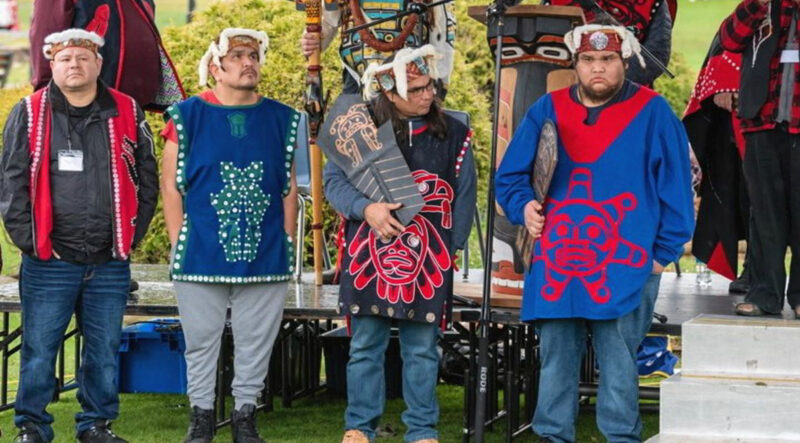First Nations assert traditional rights to farm salmon
Aquaculture-dependent First Nations in BC set to defy government agenda to remove salmon farms from their traditional territories
By Fabian Dawson
SeaWestNews
Aquaculture dependent First Nations say they will assert their traditional rights to allow salmon farming in their territorial waters, even as the Federal government bows to the demands of anti-fish farming activists to remove open-net aquaculture operations in BC waters.
The Gwa’sala-‘Nakwaxda’xw Nation (GNN) in a statement said the recent decision by Fisheries Minister Joyce Murray to renew salmon aquaculture licenses in BC for only two-year terms fails to consider Nations’ rights, economic stability, and the Federal government’s own reconciliation agenda.
“Ottawa’s decision tells us it is more concerned about virtue-signalling than actually seeking reconciliation with Indigenous Nations,” said GNN Chief Terry Walkus.
“Gwa’sala-’Nakwaxda’xw Nation is firm: we have authority to make decisions across our own traditional territory, as do other Nations,” he said.
“If the Canadian government cannot enable a policy climate for new research and technology in the industry, then companies have no incentive to stay and invest in BC’s infrastructure, and many First Nations stand to lose not just revenue and business, but a viable livelihood that supports connection to our lands and waters.”
Gwa’sala-’Nakwaxda’xw Nation also announced in a live-streamed public event that they would take over fisheries and aquaculture licensing.
At the event, both Hereditary and Elected Leaders of the Nation stood and acknowledged the traditional lands of the Kwakiutl Nation and recognized the shared lands and responsibilities with their neighbouring Kwakwaka’wakw relations. The leaders spoke about shared commitments to restore wild salmon populations in their local watersheds and the need for Indigenous authority to govern aquaculture permitting in their territories.
“We are on a path to justice through exercising our rights and responsibilities over our lands and waters, and assuming responsibility for the health and well-being of our people,” said Chief Walkus.
“We continue to wait for the Department of Fisheries and Oceans (DFO) to come to Port Hardy and consult directly on a Nation-to-Nation basis. In the meantime, the costs of these lost opportunities are adding-up, and the Nation will ensure that these problems and costs are well known to decision-makers in Ottawa.”
Ottawa last week announced a two-year renewal of aquaculture licences for 79 salmon farms in British Columbia that have been the target of a concerted fear-mongering campaign by anti-fish farm activists.
The licence renewals will allow the salmon farmers to continue to operate within the current regulations while a transition plan is being collaboratively developed to define the future of the industry, the Department of Fisheries and Oceans (DFO) said in a statement.
“Nations are ready to lead the industry into the future, and we would like to see the Canadian government recognize our co-jurisdictional authority and support our visions of what aquaculture could be,” said Chief Walkus.
“Gwa’sala- ‘Nakwaxda’xw Nation is invoking their rights and traditional protocols as they create a new standard for aquaculture industry operations that exceeds the current federal regulation. Already the Nation has been monitoring its farms with greater presence and oversight than the government has had in place for the last 30 years.”
The Coalition of First Nations for Finfish Stewardship (FNFFS), recently released an analysis that showed the direct economic benefits from salmon farming to First Nations in coastal BC exceed $50 million annually through more than 276 full time jobs, benefit payments, and contracts with indigenous-owned companies.
In total, when indirect and induced economic activity is factored in, First Nation interests in BC’s farmed salmon sector on and off reserves are estimated to generate $83.3 million in economic activity, $47.8 million in GDP, and 707 jobs earning $36.6 million in wages per year.
Eighty per cent of the salmon farms in BC operate in agreements with the First Nations in whose territories the fish are grown and harvested in.
Meanwhile, the Kitasoo Xai’xais Nation, which has been raising Atlantic salmon in partnership with Mowi Canada West for decades, has independently declared a new Marine Protected Area (MPA) for greater control of its territorial waters.
Located in BC’s remote central coast, in the heart of the Great Bear Rainforest, the new MPA is in Gitdisdzu Lugyeks, commonly known as Kitasu Bay. For the next three months, the Kitasoo Xai’xais Nation will be accepting public input on a draft management plan for the MPA.
“We are reinvigorating our traditional management systems and exercising our inherent and Aboriginal rights, responsibilities, and obligations to steward and manage the territory and resources for current and future generations,” the First Nation said.
Last May, the Ahousaht, one of BC’s largest First Nations, renewed a five-year agreement with Cermaq Canada, which provides the salmon farmer a road map on how it will conduct its marine aquaculture operations in the indigenous community’s traditional territory.
“We are at a point of unprecedented challenges brought on by climate change, and a lack of understanding, particularly in the Federal government, of our Nation’s rights and this important relationship,” said Hasheukumiss, Richard George, son of Tyee Ha’wiih and president of MHSS.
“We are committed to working together to tackle both challenges through continued advancement of meaningful and measurable climate action, a focus on the health and wellbeing of the Ahousaht Nation, the protection and enhancement of wild salmon and providing open dialogue about the shared value approach of Cermaq Canada to increase understanding across Governments of the critical role this business plays in rural coastal indigenous and non-indigenous communities alike,” he said in a statement.
(Gwa”sala-“Nakwaxda”xw Nation announced in a live-streamed public event, that they would take over fisheries and aquaculture licensing in their traditional territory. Photo: First Nations for Finfish Stewardship)

